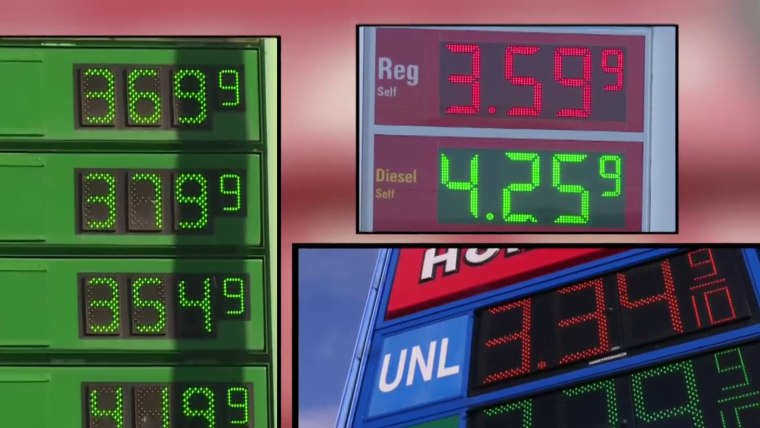WASHINGTON — Though Russia is facing a tougher resistance than expected, as well as logistical setbacks during the first week of its military offensive in Ukraine, U.S. and European officials warn that the darkest days of the invasion lie ahead.
As the Biden administration prepares for the worst to unfold in Ukraine in the coming days and weeks, it is internally discussing possible sanctions on Russia’s energy sector, current and former U.S. officials said.
Those discussions include looking at potential ways to structure such sanctions to avoid targeting daily oil sales, and instead taking aim at future production and investments in Russia’s energy industry.
“We don’t have a strategic interest in reducing the global supply of energy,” an administration official said. “That would raise prices at the gas pump for Americans and pad Putin’s profits.”
“But we and our allies and partners share a strong interest in degrading Russia’s status as a leading energy supplier over time,” the official added.
Still, barring some unexpected development, U.S. and European officials said they see no possibility for any diplomatic resolution to head off what they expect to be a brutal assault on key parts of Ukraine. The only way to do so would be if Russian President Vladimir Putin decided to de-escalate by agreeing to a cease-fire and beginning to leave Ukraine, a U.S. official said, adding: “There are no signs Putin is willing to do either at this point.”
A senior Western intelligence official said Russia seems to have realized that its initial approach was misguided and is changing its tactics. Pentagon press secretary John Kirby seemed to echo that sentiment Wednesday, saying Russian forces are regrouping and reassessing their strategy.
“The violence level will go up, the numbers of refugees will go up, the numbers of civilian casualties and civilian dead will go up,” the Western intelligence official predicted. “The cruel military math of this will eventually come to bear absent some intervention, absent some fundamental change in the dynamic.”
Officials expect Russia to topple the Ukrainian government and they predict a civil and armed resistance will take hold.
Ed Ferguson, British minister counsellor of defense, said that once Putin takes over parts of Ukraine, “I think he will have an insurgency on his hands.”
The Biden administration has vowed to escalate sanctions against Russia as Putin escalates military action in Ukraine, and has steadily done so over the past week.
President Joe Biden and other senior administration officials, however, have emphasized that the goal is to tailor sanctions so they have maximum impact on Russia, while trying to minimize any fallout on the U.S. and European economies. When sanctioning Russia’s access to the SWIFT banking system, for instance, the United States and Europe structured the move so it left banks available to facilitate payments for oil sales.
While some Republican lawmakers are publicly calling for sanctions targeting Russia’s oil and gas sector, Democrats in Congress are wary of any direct action against Russian oil sales that could trigger a massive spike in oil prices. Some remain open, however, to ideas that would expand domestic energy production, congressional aides said.
The U.S. and especially Europe rely on Russian oil. This week the Biden administration announced it would release 30 million barrels of oil from the Strategic Petroleum Reserve in an attempt to address rising gas prices.
“We are looking at other options we could take right now to cut U.S. consumption of Russian energy, but in the context of maintaining a steady global supply of energy,” the administration official said.
Behind the scenes, U.S. officials have in recent days been telling U.S. allies that the situation in Ukraine will get very “ugly,” as one of them put it. Another said officials have increasingly given the sense of no “light at the end of the tunnel.”
These officials say Russia is likely to expand on the methods it has used in recent days: Targeting urban areas and inflicting more damage on civilian buildings and sites.
Fueling the dire predictions is the assessment by the West that Russia is not backing down but doubling down in the face of Ukrainian resistance.
“We’re seeing more assets and armor and others being brought up,” a European official said. “So we know they’ve got difficult days ahead.”
The Western intelligence official noted that in the early days of the invasion, Russia used lighter military units that were highly mobile but less able to support themselves for long periods, as well as spearhead units, special forces and airborne capabilities that could move quickly but don’t carry as much with them.
But now, the official said, “the concern we have is that they seem to be now bringing in heavier forces, with more armor, more long-range artillery, heavier weapons, that are not just more destructive in their nature, but frankly, are also less precise.”
Of Ukraine’s resistance so far, the official echoed what U.S. officials have said: “It’s great that they’re that brave, the military and the civilians. It’s awesome. But I’m not going to tell you that’s enough on its own.”
Source: | This article originally belongs to Nbcnews.com











